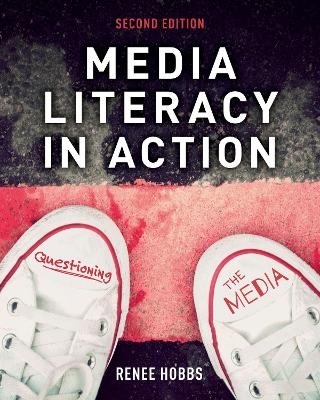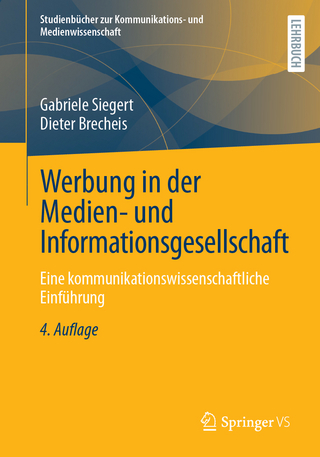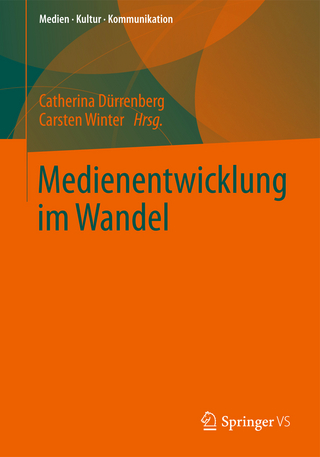
Media Literacy in Action
Rowman & Littlefield (Verlag)
978-1-5381-8013-6 (ISBN)
Media Literacy in Action addresses learners who are simultaneously active as both creators and consumers of media messages. At the same time, the book recognizes that everyone is vulnerable to media influence because of our dependence on the instant gratification and feelings of connectedness that digital platforms provide. To thrive in a media-saturated society, people need to ask critical questions about what we watch, see, listen to, read, and use. This book gives students those tools.
Key features of the second edition:
Critical examination of AI technologies, algorithmic personalization, data privacy and surveillance, and the increased global regulation of digital platforms
Attention to media literacy for empowerment and protection
Inquiry-oriented approach to learning that cultivates intellectual curiosity and creative expression
Full-color presentation with figures and photos to increase student engagement
Each chapter includes:
Media Literacy Trailblazers: Profiles of key thinkers and their theories connect students with the discipline of media literacy
Media Literacy DISCourse (NEW): Visual representations of media literacy theoretical principles help learners internalize the practice of asking critical questions as they respond to specific media examples
Learning in Action (NEW): Summary and vocabulary sections combine with Analyze, Create, Reflect, and Act activities to empower students to apply ideas from each chapter.
Supplemental Materials available at www.mlaction.com:
Students can review key ideas, learn about more Media Literacy Trailblazers, and watch videos aligned with each chapter
Instructors can access a Teacher’s Guide of best practices, in-class activities, homework, and projects. Also available are chapter summaries, lecture slides, YouTube playlists, and test materials.
Renee Hobbs is one of the world’s leading authorities on digital and media literacy education and a professor at the University of Rhode Island’s Harrington School of Communication and Media. As a teacher, researcher, activist, and media professional, she has offered programs for educators on four continents and produced some of the leading empirical research on the subject. Hobbs is the author of 12 books and more than 200 scholarly and professional articles. Her work has received awards from professional organizations including the International Communication Association, the Media Ecology Association, the National Association for Media Literacy Education, and others. In collaboration with the Media Education Lab, Hobbs created COURAGEOUS RI, a statewide media literacy program designed to use media literacy and active listening to reduce the fear and hate that leads to violence, funded by the U.S. Department of Homeland Security. She has spoken at the United Nations and consulted extensively with educators, school leaders, and government officials in Belgium, Brazil, China, Croatia, Lebanon, the Netherlands, Germany, Romania, and many other countries.
Preface
PART I: UNDERSTANDING MEDIA
Chapter 1 What Is Media Literacy?
Chapter 2 Why Do People Use Media?
Chapter 3 How Do Search Engines Work?
PART II: FORMS AND GENRES
Chapter 4 How Do People Get the News?
Chapter 5 What Is the Difference between Advertising, Public Relations, and Propaganda?
Chapter 6 Why Are We Attracted to Characters and Stories?
PART III: JUDGMENTS ABOUT TASTE, QUALITY, AND TRUST
Chapter 7 Why Do People Prefer Different Kinds of Music, Movies, and TV Shows?
Chapter 8 Who Decides What Makes Media “Good”?
Chapter 9 How Do People Decide Who and What to Trust?
PART III: MEDIA ECONOMICS
Chapter 10 How Do Media Companies Make Money?
Chapter 11 Are Social Media Free?
PART IV: MEDIA EFFECTS
Chapter 12 Why Do People Worry about Stereotypes?
Chapter 13 What are the Benefits and Harms of Using Media?
| Erscheinungsdatum | 20.12.2024 |
|---|---|
| Zusatzinfo | 3 Color Illustrations, 223 Color Photos, 1 Tables |
| Verlagsort | Lanham, MD |
| Sprache | englisch |
| Maße | 211 x 262 mm |
| Gewicht | 1343 g |
| Themenwelt | Sozialwissenschaften ► Kommunikation / Medien ► Kommunikationswissenschaft |
| Sozialwissenschaften ► Kommunikation / Medien ► Medienwissenschaft | |
| Sozialwissenschaften ► Soziologie ► Empirische Sozialforschung | |
| ISBN-10 | 1-5381-8013-8 / 1538180138 |
| ISBN-13 | 978-1-5381-8013-6 / 9781538180136 |
| Zustand | Neuware |
| Informationen gemäß Produktsicherheitsverordnung (GPSR) | |
| Haben Sie eine Frage zum Produkt? |
aus dem Bereich


